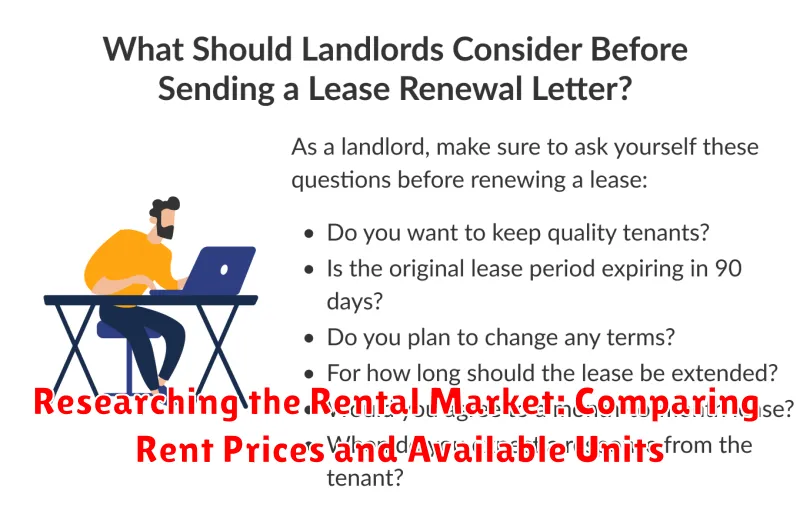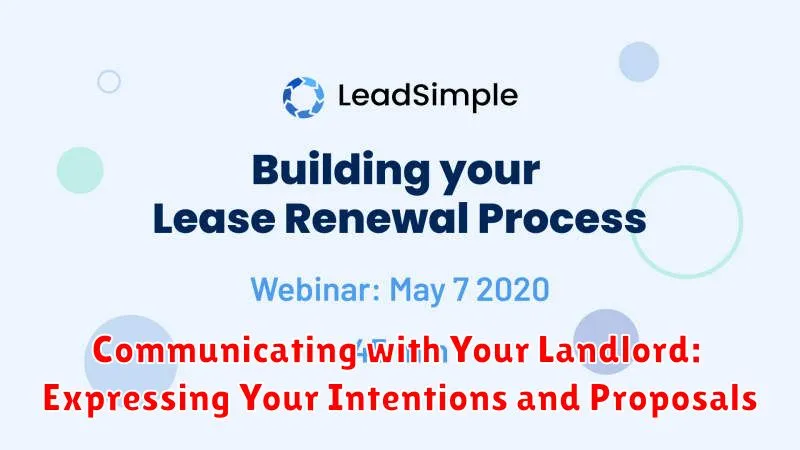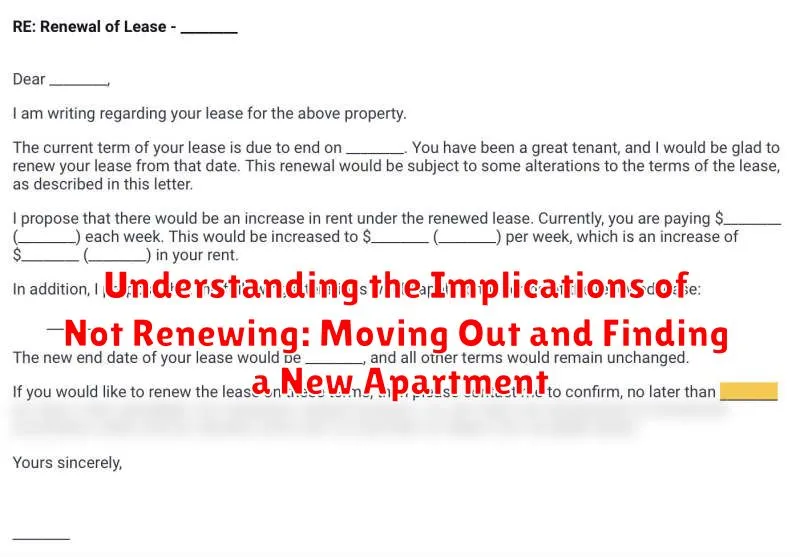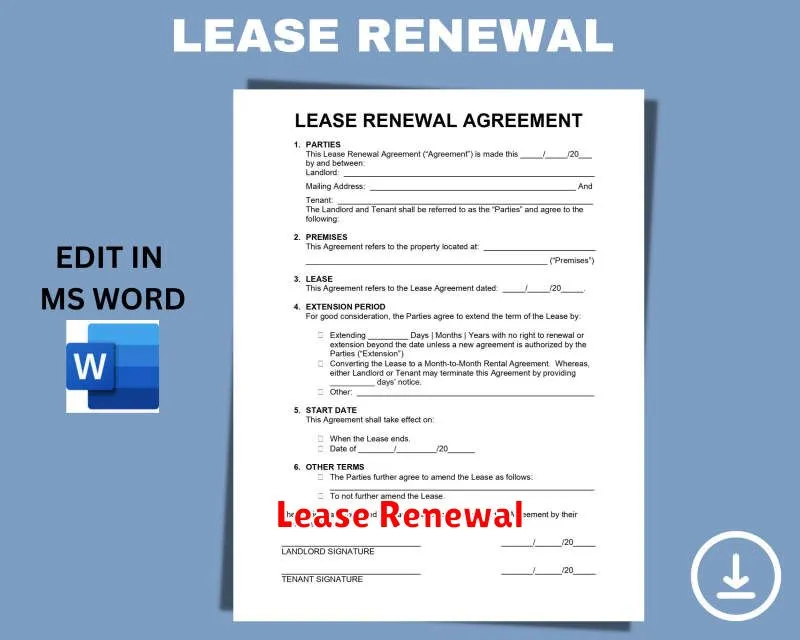Are you a renter approaching the end of your lease term? It’s time to think about your next move! Lease renewals can be a complex topic, but it’s crucial to understand your rights and options to make the best decision for your situation. This article will equip you with all the essential information you need to navigate the lease renewal process, from understanding your options to negotiating the best terms possible. Whether you’re considering staying in your current apartment or seeking a new place, we’ll break down everything you need to know to make an informed choice.
Understanding Your Lease Renewal Options: Renewing, Negotiating, or Moving Out
As your lease approaches its end date, you’ll be faced with an important decision: renew, negotiate, or move out. Each option has its pros and cons, and understanding them can help you make the best choice for your situation.
Renewing your lease is the simplest option. It often involves signing a new lease agreement for the same terms as your current one, but with a higher rent. While it provides stability and avoids the hassle of moving, it might not be ideal if your rent has increased significantly or you’re unhappy with the property.
Negotiating your lease is another option, but it requires some effort. You can try to negotiate a lower rent, request improvements to the property, or discuss changes to the lease terms. This option is best suited for renters who are happy with the property but want better terms. Keep in mind that your landlord may not be open to negotiating.
Moving out is the final option. This can be a good choice if you’re unhappy with the property, your rent is too high, or you need a change of scenery. However, it involves the hassle of finding a new place, packing, and moving. You may also face penalties if you break your lease agreement.
The decision to renew, negotiate, or move out ultimately depends on your individual circumstances. Consider your budget, your needs, and your priorities before making a decision. Don’t be afraid to talk to your landlord about your options and explore all possibilities.
Timing Your Lease Renewal: Key Dates and Deadlines
When it comes to your lease renewal, understanding the key dates and deadlines is crucial. Missing a deadline could lead to unexpected consequences, such as a month-to-month lease or even eviction. Here’s a breakdown of the important dates you need to be aware of:
Notice Period: This is the timeframe specified in your lease agreement, informing your landlord of your intention to renew or vacate. It’s typically 30-60 days before your lease expires. Make sure you provide notice within the stipulated time frame to avoid any complications.
Lease Expiration Date: This is the official end date of your current lease. If you don’t renew, you’ll be considered a month-to-month tenant, subject to a new rental agreement with potentially different terms.
Renewal Deadline: Your landlord might have a deadline for accepting or rejecting your renewal request. This deadline could be within the notice period or after it. Ensure you understand the specific deadline set by your landlord.
Rent Increase Notification: If your landlord plans to increase rent for the renewed lease, they must provide you with written notice of the new rent amount. The timing of this notification varies depending on your location and the terms of your lease.
Negotiation Period: If you’re looking to negotiate the terms of your renewal, including rent, you’ll have a specific period to do so. This period might be set by your landlord or by local laws.
Keeping track of these dates and deadlines ensures a smooth transition into your new lease. Familiarizing yourself with your lease agreement and communicating effectively with your landlord can help avoid any surprises or issues.
Negotiating Your Lease Renewal Terms: Rent, Amenities, and Lease Length
Your lease is about to expire, and you’re considering renewing. It’s a great opportunity to negotiate the terms of your lease, especially if you’re happy living in your current rental. While you may be satisfied with the current rent and amenities, a little negotiation can go a long way in making your living experience even better.
Here’s what you should know about negotiating your lease renewal:
Rent
Rent is often the biggest bargaining chip in a lease renewal negotiation. Research your local rental market to understand current rates for comparable properties. If you’ve been a responsible tenant, paying rent on time and maintaining the property, you have a good case for a rent increase that’s less than the market average.
Be prepared to justify your request with data, showing the current market rates for similar rentals in your area. Consider offering to sign a longer lease term in exchange for a lower rent, or negotiate a rent increase tied to a specific timeframe.
Amenities
This is where you can get creative! If your building lacks certain amenities that you value, like a fitness center, laundry facilities, or parking, this is the time to negotiate for them. You can also try to negotiate for upgrades to existing amenities, such as new appliances or updated furniture.
The success of your negotiation depends on the landlord’s willingness to make improvements. Be polite and respectful, and frame your requests as mutually beneficial, like “I’m looking for a longer lease term, and I think these upgrades would make the property more attractive to future tenants.”
Lease Length
Some landlords are open to negotiating the lease length, particularly if you’re a reliable tenant. You might negotiate a shorter lease term if you’re unsure about your future plans or a longer term to lock in a lower rent. Be prepared to explain your reasoning and be flexible.
Remember, the negotiation process is a conversation. Be respectful, open-minded, and ready to compromise to reach a mutually beneficial agreement. Good communication and a proactive approach will help you secure the best possible lease renewal terms for your rental property.
Evaluating Your Current Apartment: Considering Your Needs and Priorities
As your lease approaches its end, you’re faced with a significant decision: renew or find a new place? This decision shouldn’t be taken lightly. It’s essential to thoughtfully evaluate your current apartment and assess whether it still meets your needs and priorities.
Start by considering your lifestyle. Have your needs changed since you first moved in? Have you started working from home, requiring a dedicated office space? Do you need more storage? Perhaps your family has grown, demanding additional bedrooms or a larger living area.
Next, evaluate your budget. Rents can fluctuate, and it’s crucial to understand how your current rent aligns with your current financial situation. Consider factors like potential increases, additional costs like utilities and parking, and your overall financial goals.
Don’t overlook your comfort and amenities. Are you satisfied with the apartment’s condition? Are the building amenities still relevant to your lifestyle? Do you feel safe and secure in your current neighborhood? Assessing these factors will provide valuable insight into your overall happiness and satisfaction.
Finally, consider the future. If you plan on staying in the area for a longer term, is this the right place for you? Do you anticipate any significant life changes in the coming years that might influence your housing needs?
By honestly evaluating your current apartment against your evolving needs and priorities, you’ll be better equipped to make a confident decision about your next move.
Researching the Rental Market: Comparing Rent Prices and Available Units

Before you make a decision on your lease renewal, it’s crucial to understand the current rental market. Take some time to research and compare rent prices and available units in your area. This will give you valuable insights into whether your current rent is competitive and if there are better options available. Websites like Zillow, Apartments.com, and Trulia can be helpful resources for this research.
When comparing rent prices, consider factors like the size and location of the unit, amenities, and overall condition. It’s also important to factor in potential moving costs, such as security deposits and application fees, when evaluating different options.
By researching the rental market, you can make an informed decision about whether renewing your lease is the best choice for you. If you find that similar units are available at a lower price, you might have leverage to negotiate a better deal with your current landlord. Or, if you find a better unit that suits your needs better, you can consider moving.
Preparing for Lease Renewal Negotiations: Gathering Supporting Documents
As your lease approaches its end, you’ll likely be faced with a crucial decision: renewing your lease or searching for a new place. If you’re inclined to stay, it’s essential to prepare for lease renewal negotiations. One critical aspect of this process is gathering supporting documents that can bolster your case and help you achieve favorable terms.
Here are some key documents to gather:
- Your Current Lease Agreement: This document outlines the current terms and conditions of your lease, providing a baseline for negotiations. Make sure you understand your current rent, lease duration, and any other relevant clauses.
- Proof of Rent Payments: A record of timely and consistent rent payments demonstrates your reliability as a tenant. This can be in the form of bank statements, canceled checks, or online payment confirmations.
- Maintenance Records: Keep a record of any maintenance requests you’ve submitted and the landlord’s responses. This documentation can showcase your responsible upkeep of the property.
- Local Rental Market Data: Researching comparable rentals in your area can give you an idea of current market rates. This data can be helpful in negotiating a fair rent increase.
- Positive Landlord Feedback: If you have a good relationship with your landlord, try to obtain written feedback expressing their satisfaction with your tenancy. This can be a strong point in your favor.
Having these documents readily available will equip you with the necessary information to approach lease renewal negotiations confidently and effectively. It demonstrates your responsible tenancy and allows you to advocate for your interests.
Communicating with Your Landlord: Expressing Your Intentions and Proposals

Once you’ve decided whether or not you’ll be renewing your lease, it’s crucial to communicate your intentions to your landlord in a timely manner. Most leases have clauses requiring you to give advance notice (typically 30-60 days) if you intend to renew or vacate.
If you are renewing, you might consider proposing a lease renewal agreement that reflects your current needs and preferences. This could involve negotiating rent adjustments, addressing maintenance issues, or seeking clarity on lease terms.
When communicating with your landlord, it’s best to be:
- Professional: Use respectful language and maintain a courteous tone.
- Clear: State your intentions and proposals concisely and directly.
- Timely: Respond within the stipulated time frame mentioned in your lease agreement.
- Document everything: Keep records of all communication, including emails, letters, and phone calls.
It’s also advisable to put your intentions and proposals in writing, either via email or a formal letter. This ensures a clear understanding and helps avoid potential disagreements down the line.
Making Your Decision: Weighing the Pros and Cons of Renewal
When your lease is nearing its end, you’re faced with a crucial decision: renew or move? While staying put offers the comfort of familiarity, it’s essential to weigh the pros and cons carefully. Let’s explore the factors that can help you make the best choice for your situation.
Staying Put: The Advantages
- Stability and Convenience: Staying in your current place eliminates the stress of finding a new apartment, packing, moving, and settling in. You’re already comfortable with your surroundings, your neighbors, and the amenities.
- Financial Predictability: Knowing your rent amount and lease terms for another year provides financial stability, especially in fluctuating housing markets.
- Potential for Rent Increases: While rent increases are common, they might be smaller than what you’d face in a new apartment.
- Existing Relationships: You’ve likely built relationships with your landlord, neighbors, and local businesses.
Considering a Move: The Potential Benefits
- Upgrade Your Living Space: A new apartment could offer more space, modern amenities, or a better location.
- Lower Rent: The market might offer better deals elsewhere, even with the costs associated with moving.
- New Neighborhood Exploration: Moving allows you to explore a new area that might be closer to your work, hobbies, or other important factors.
- Fresh Start: If you’re seeking a change of scenery or a chance to redecorate, moving can provide that opportunity.
Ultimately, the decision to renew your lease is a personal one. It’s important to assess your individual needs and priorities. Consider your budget, your comfort level with your current living situation, and the future you envision. A clear understanding of the pros and cons will help you make a choice that aligns with your overall goals.
Understanding the Implications of Not Renewing: Moving Out and Finding a New Apartment

Choosing not to renew your lease can be a big decision, and it comes with a set of implications. It’s crucial to understand the consequences of moving out before making a decision. Here’s what you should know:
First, you need to give proper notice to your landlord. The required notice period is typically stipulated in your lease agreement. Failing to provide sufficient notice can lead to financial penalties like breaking your lease agreement. If you’re not sure about your notice period, contact your landlord to clarify.
Secondly, consider the financial implications. Moving out can be costly. You might incur expenses like:
- Moving costs: hiring movers, packing supplies, and transportation.
- Security deposit: You may lose all or part of your security deposit depending on the condition of the apartment upon move-out.
- Early termination fees: Your lease agreement may include a fee for breaking the lease early.
Finally, you’ll need to find a new place to live. Start your search early, and don’t forget to factor in the costs of renting a new apartment, including application fees, security deposits, and potentially first and last month’s rent.
Finding a new apartment can be a stressful process. It’s essential to do your research and be prepared for the costs and logistics involved. Be sure to factor in all the implications before making a decision to move out.

